A little over two months after city council put the final touches on the 2020-23 multi-year budget, the time to begin working on the next multi-billion-dollar budget has arrived — and it is shaping up to be a difficult debate.

During Tuesday evening’s strategic priorities and policy committee (SPPC) meeting, city councillors directed staff to aim for a draft budget with an annual tax levy increase between 2024 and 2027 in the range of 2.9 and 3.9 per cent.
While the 2.9 to 3.9 per cent range was the initial recommendation from staff on what was needed to maintain service levels over the four years, it took councillors nearly three hours to reach the conclusion.
The marathon debate to set a range for a draft budget councillors will not see until December featured disagreement on where the tax levy increase should land, with multiple instances of councillors pondering calling a point of order on each other, but never actually doing so.
The long-lasting debate started as soon as deputy mayor Shawn Lewis put forward a motion at the beginning of the discussion directing staff to bring a draft budget with the range staff recommended.
Some, like Ward 5 Coun. Jerry Pribil, argued there should be no tax levy increase, while others, like Ward 11 Coun. Skylar Franke, proposed a hike of nearly six per cent a year.
- NDP to join Bloc in backing Liberals against non-confidence vote
- Republican Mark Robinson denies making racist, sexual posts on porn site
- Macron and Trudeau will meet in Canada next week. What’s on the agenda?
- Ethics commissioner will not investigate Boissonnault over ‘Randy’ texts, says the matter is closed
Franke was joined by councillors David Ferreira and Sam Trosow in voicing concern over restricting the budget to simply maintaining service levels, arguing letting go of implementing action points from a recently finalized strategic plan could result in the city falling behind.

Get breaking National news
“I think to try to pigeonhole this into not having anything greater than 3.9 per cent is a huge mistake to start this process,” said Trosow, adding it is equivalent to austerity measures.
Trosow suggested a program for residents who might struggle to pay the tax levy but was informed by staff a clause in the municipal act already provides for such cases. However, staff added that the process to receive the funding is highly rigorous and is seldom used due to the amount of information needed to be provided.
On the other end of the spectrum, councillors Pribil, Paul Van Meerbergen and Peter Cuddy said with the current rates of inflation and costs of goods such as food, council cannot pass along any more added costs to residents.
“In these times of interest rates, we certainly need fiscal responsibility,” said Cuddy.
“We are stewards of this city and we have to manage it with the greatest respect and responsibility.”
After struggling to compromise even to take a dinner break (they did for 25 minutes after nearly two hours of debate), the council appeared heading for a deadlock on where the range should fall.
In the end, a compromise from Mayor Josh Morgan suggested that once staff determine what the annual tax levy increase within the 2.9 to 3.9 range should be for maintaining services, 0.5 per cent be added for implementing initiatives from the strategic plan.
Based on Morgan’s suggestion, staff would include roughly $37.5 million of initiatives as recommended in the budget, leaving the rest for council’s consideration once presented with a draft budget.
The suggestion from Morgan was backed by Lewis and his seconder Coun. Steve Lehman and eventually put to a vote, where it was passed 12-3. The no votes came from Trosow, Ferreira and budget chair Elizabeth Peloza.
Regular council will still need to approve the committee’s vote at its next meeting on Monday.
The draft budget is scheduled to be tabled on Dec. 12.












Comments